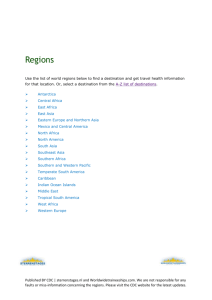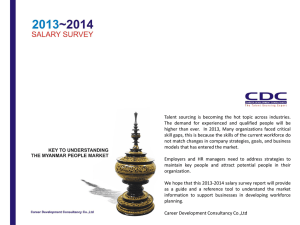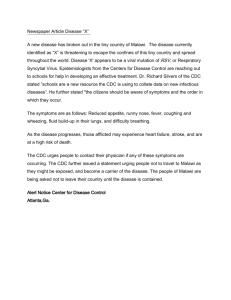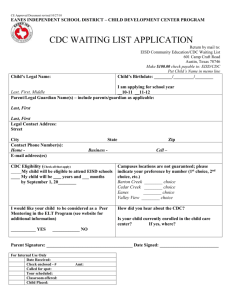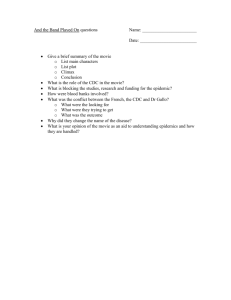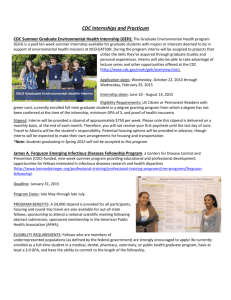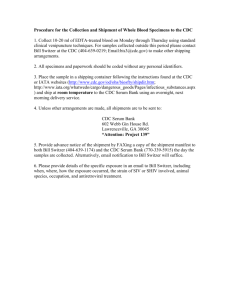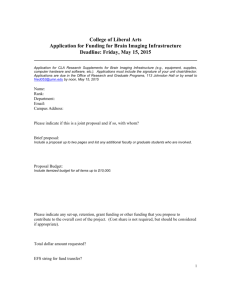FY 2003
advertisement
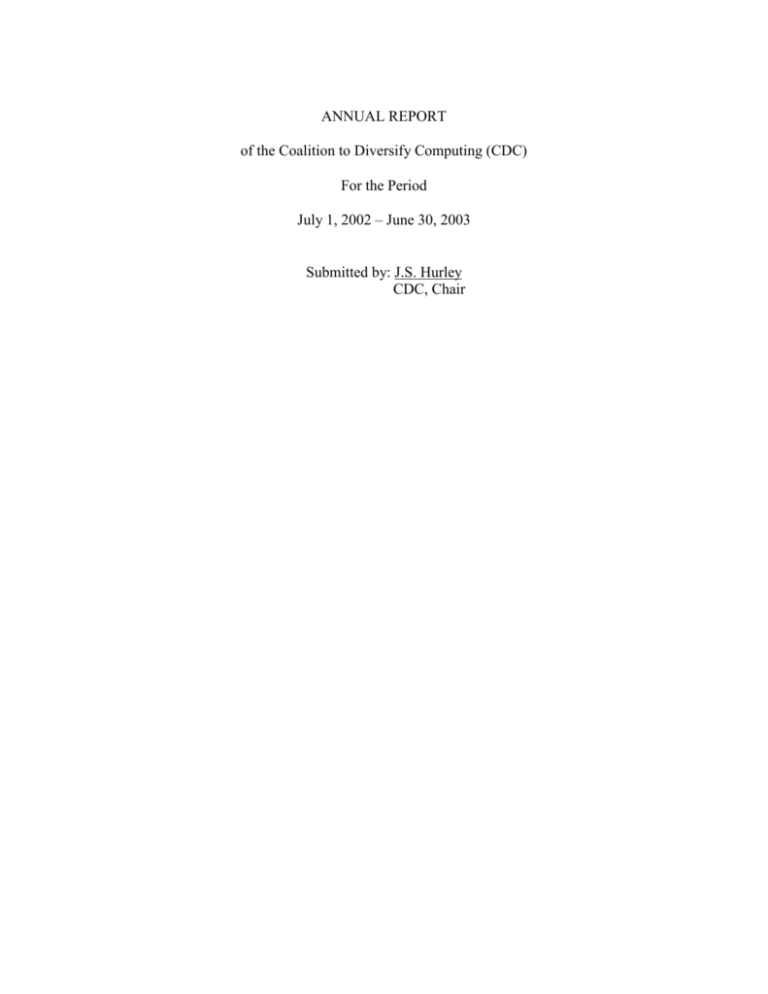
ANNUAL REPORT of the Coalition to Diversify Computing (CDC) For the Period July 1, 2002 – June 30, 2003 Submitted by: J.S. Hurley CDC, Chair 1. 1.1 BASIC INFORMATION Committee Members 1.1.1 Chair, J.S. Hurley, Clark Atlanta University, Distinguished Lecturer Series, Term of Office, July 1, 2003 – June 30, 2004 1.1.2 Chair-Elect, Monica Martinez-Canales, Sandia National Laboratory, Tapia Conference (2003), Program Co-Chair, Term of Office, July 1, 2004 June 30, 2005 1.1.3 Past Chair, Valerie Taylor, Texas A&M University, CDC Database, Term of Office, July 1, 2002 – June 30, 2003 1.1.4 Andrea Lawrence, Spelman College, Traveling Graduate School Forum 1.1.5 Pat Teller, University of Texas-El Paso, Sending Students/Mentors to Technical Conferences 1.1.6 Allison Clark, NCSA/UIUC, Distributed Rap Sessions 1.1.7 Phoebe Lenear, NCSA/UIUC, Distributed Rap Sessions 1.1.8 Charles Isbell, Georgia Institute of Technology, Distinguished Lecturer Series 1.1.9 Stephenie McLean, NCSA/UIUC, CDC Database 1.1.10 Mekbib Gemada, CDC Database 1.1.11 Eric Brittain, MIT, CDC Website 1.1.12 Bryant York, Portland State University, Tapia Conference (2003), General Co-Chair 1.1.13 Juan Meza, Lawrence Berkeley Labs, Tapia Conference (2003), General Co-Chair 1.1.14 Cynthia Lanius, Tapia Conference (2003),Banquet Program Chair 1.1.15 Radha Nandkumar, NCSA/UIUC, Tapia Conference (2003), Finance Chair 1.1.16 Pamela Williams , Sandia National Laboratory, Tapia Conference (2003), Program Co-Chair 1.1.17 Theresa Chatman, Rice University, Tapia Conference (2003), Local Arrangements Chair 1.1.18 Jeffrey Forbes, Duke University, Traveling Academic Forum 1.2 No ad hoc committees. 1.2.1 Sending Students/Mentors to Technical Conferences – Pat Teller Purpose: Increase the number of underrepresented ethnic minority students participating in STEM (Science, Technology, Engineering, and Mathematics) research, with a particular focus on the area of computing. A way of accomplishing this goal is to assist faculty and students with gaining expertise in new and desired areas of computing and having opportunities to network with researchers in these fields. 1.2.2 CDC Database – Stephenie McLean 2 Purpose: Increase the participation of minorities in research in computerrelated areas, CDC, with funding from the NSF PACI Program via the EOT Programs, has developed this database of minority researchers and graduate students. The focus is on the areas of computer engineering, computer science and computational science because of the dismal representation of minorities in the research in these areas. The database will serve as a resource for disseminating of information about CDC, NPACI and Alliance programs and activities and building a network of individuals with common goals. 1.2.3 Distributed Rap Sessions – Phoebe Lenear Purpose: Strong support systems are critical to the success of any rigorous graduate program; especially graduate programs in computer engineering, computer science and computational science. The demands of such programs clearly reveal the need for strong support groups that include a community of peers with common backgrounds, both ethnically and intellectually. This problem can be especially serious for minority graduate students in the area of computing, for which the numbers are very small. Focus on building a virtual community of minority undergraduate and graduate students that can “rap” on research and school experiences via specialized mediums such as the Access Grid; 1.2.4 Traveling Graduate School Forum – Andrea Lawrence Purpose: Budgetary constraints have significantly impacted the ability of institutions to bring in speakers to engage in discussions on how to prepare, cope and successfully maneuver through the many different aspects of the graduate school experience. CDC views the ability to openly discuss and get vital information on opportunities in graduate programs in computer-related fields is too vital an experience for undergrads to not undertake. As a result, CDC has developed an opportunity in which speakers can visit the campuses to have such dialogue and provide critical information and materials to students. Oftentimes, the most important information for students about the choices for their academic pursuits is defined during many of these sessions. When possible, we try to leverage the scheduled forums with other events to reduced costs and enable CDC to provide more sessions during the year. One such forum was held in conjunction with the Grace Hopper Conference in October 2002, and involved a panel on “The Culture of Graduate Schools” at the. The panel, entitled "The Culture of Graduate School" was well attended. 1.2.5 Distinguished Lecturer Series- J.S. Hurley Purpose: The difficulty associated with retaining quality students in SEM fields for graduate education is widely recognized as a national problem. The situation is even more pronounced at Minority Serving Institutions (MSIs). Role models can be critical in motivating students to pursue highly rewarding careers in SEM fields. The distinguished lecture series 3 will involve invited minority researchers from academia and industry who will give lectures at majority and minority serving institutions on the opportunities; technologies; and relationships needed to be successful in computer technology-based disciplines. Participation can take place by submitting to CDC the following information, including:[identifying topic, speaker and her/his institution, submitting a short 1 paragraph abstract of talk and statement of expected goal of lecture(couple of sentences, max.), potential date, leveraging with other intended events to optimize benefit]. Talks will be open to students (undergrad /grad) and faculty. 1.2.6 Traveling Academic Forum – Jeffrey Forbes Purpose: As part of the Traveling Academic Forum, a series of workshops are proposed for members of minority groups severely underrepresented in the faculty of computer science departments. Diverse faculty are considered critical to addressing the diverse needs of cultures in applied science fields in general, and computer-related fields in particular, to bring benefits such as: improved communications, better mentoring experiences, larger pools of professors and researchers, broader role model pool; and greater confidence in ability to succeed and factors or variables involved. Ultimately, we believe that a higher quality workforce will inevitably result from a larger pool of qualified and motivated candidates. Future workshops are planned in conjunction with future NSBE, ACM, and Black Data Processing Association conferences. A goal of this project is to provide information that will help us learn more about ways to increase the pool of faculty. 1.2.7 Richard Tapia Celebration of Diversity in Computing Conference – Juan Meza & Bryant York Purpose: Bring together faculty, students, and members of the commercial and government sectors to celebrate the value and benefits of Diversity in computing-related fields that have been so aggressively pursued by Dr. Richard A. Tapia during his career. The conference highlights creative, innovative, and original research and applications of computing. This year's conference will take place Oct 15-18, 2003 in Atlanta, GA and will be sponsored by the Association of Computing Machinery and the Computing Research Association in cooperation with the IEEE Computer Society. 4 2. PROJECT SUMMARY List all projects, of the committee or its subunits that have been active at any time during the calendar year. Use this format: Coalition to Diversify Computing A Joint Committee of the ACM, CRA and IEEE-CS www.cdc-computing.org Status Report: September 2002 through January 2003 Valerie Taylor, Texas A&M University Chair John Hurley, Clark Atlanta University Chair-Elect The following is an update of CDC activities during the period of September 2002 through January 2003. During this time the members participated in two conference calls (one in October and one in November), sponsored by CRA. The conference calls allowed members to discuss the proposed Bylaws and progress with current projects. The calls were very effective, for which we plan to continue the calls on a monthly basis. The following issues were resolved during the calls: November Call (all members): The proposed CDC Bylaws were approved unanimously. Recently, the Bylaws were sent to the three sponsoring organizations for approval. November Call (executive committee members): John Hurley was elected to the position of Chair-Elect as defined by the bylaws. The following is an update of the CDC projects. Richard Tapia Celebration of Diversity in Computing Conference 2003: Significant progress has been made with the planning for the Tapia Conference 2003. In particular the following tasks have been accomplished: o Put together the full program committee. o Secured a strong advisory committee. o Confirmed all plenary speakers: Warren Washington Valerie Taylor Peter Freeman Margaret Wright Josez Munoz o Raised ½ of the needed corporate support by November 1. o Submitted the NSF proposal for $72K for student scholarships and the doctoral consortium 5 o Advertised the Call for Papers at CRA Snowbird, GHC 2002 and SC 2002 o Moved the Tapia Conference web pages to NCSA. The web pages are available. o Sent personal invitation for the CFP to 51 recent minority PhDs in CS/CE. o Secured the START system for web-based submission. The site is ready for submissions. Project Leaders: Juan Meza and Bryant York. Sending Students/Mentors to Technical Conferences: We are elated to announce that the first awards have been made. In particular awards were made to the following: o University of South Carolina: Heather Wake, who currently is pursuing her B.S. in Computer Engineering; Dr. Duncan Buell, Professor and Chair, is her mentor. They will attend IEEE FCCM (Field Programmable Custom Computing Machines) Conference in April. o City University of New York: Omar Santiago, who currently is pursuing his M.S. in Mechanical Engineering; Dr. Damian Rousson, Assistant Professor, is his mentor; Dr. Rousson also is receiving an award. They will attend SIAM Conference on Computational Science and Engineering (CSE03) in February. o Auburn University: Dale-Marie Wilson and Sherri Frizell, both of whom are pursuing Ph.D.s in Computer Science and Software Engineering; Dr. Juan Gilbert, Assistant Professor, is their mentor; Dr. Gilbert also is receiving an award. They will attend ACM CHI 2003: New Horizons Conference in April. Awardees are asked to complete trip reports as a requirement of the award. This report will document their journeys and our efforts. The next deadline is March 1, 2003. Project Leader: Patricia Teller. CDC Website: The CDC website has been moved to NCSA, since CDC membership includes researchers at NCSA. Distributed Rap Sessions (DRS): Two very successful Distributed Rap Sessions were held during this time period. One was held on 23 October 2002 with Jackson State and UIUC. During this session many undergrads expressed interest in participating in a group research project. The second DRS was held on 20 November 2002, during the SC conference. Again this session was excellent with many CDC members participating at the SC Access Grid nodes as well as students at other universities. The focus of this session was on graduate school and the climate for minorities. 6 At this time the project leaders are attempting to set up two projects, led by faculty and involving students, to be done over the Access Grid. The students will be paid as REU for the project work. Project Leaders: Allison Clark and Phoebe Lenear Traveling Graduate School Forum: During this time, one graduate school forum was held at the Grace Hopper Conference in October 2002. The panel, entitled “The Culture of Graduate School” was well attended. Andrea Lawrence also organized a panel at the SC Conference to discuss research at the Minority Serving Institutions. Future forums are scheduled at Jackson Statue University and in Washington, DC this month. A forum will also take place during the ADMI Conference this summer. Project Leaders: Andrea Lawrence Distinguished Lecturer Series: During this time period three distinguished lectures occurred. o Morgan State University: John Hurley gave a lecture entitled “High Throughput Computing (HTC) and JAVA Interface Design and Implementation”. The host was Eugene DeLoatch, Dean, College of Engineering. o Howard University: Valerie Taylor gave a lecture entitled “What’s Performance Got to Do with It?” The host was Dr. Chouikha, Chair, EE Department. o University of Maryland in Baltimore County: Valerie Taylor gave a lecture entitled “What’s Performance Got to Do with It?” The hosts were Dr. Tim Finin, Professor in CS Department, and Dr. Janet Rutledge, Associate Dean of the Graduate School. Contact has been made with the following universities for lectures in the very near future: o Winston-Salem State University: contact has been made with Carolyn Anderson. o University of Puerto Rico: contact has been made with Wilson Rivera. A date has been identified and we are working with the speakers to confirm the date and make travel arrangements. o Florida International University: contact has been made with Amado Gonzalez. Dates have been identified in February; we are in the process of finalizing the schedule with the speaker. o Prairie View A&M University: contact has been made with Mohsen Beheshti. A date has been identified and we are working with the speakers to confirm the date and make travel arrangements. 7 Project Leaders: John Hurley and Charles Isbell Coalition to Diversify Computing A Joint Committee of the ACM, CRA and IEEE-CS www.cdc-computing.org Status Report: January 2003 through June 2003 Valerie Taylor, Texas A&M University Chair John Hurley, Clark Atlanta University Chair-Elect The following is an update of CDC activities for the period of January 2003 through June 2003. During this time one in-person was held in Atlanta, Georgia, March 28, 2003. During this meeting, much was accomplished in terms of project updates and discussions with CRA-W about possible joint project. CDC is now working with CRA-W to write a joint project to extend CRA-W’s CREW project to minorities (CREW/M). Further, a meeting was held on June 7, with key representatives from the three societies, to discuss the Joint Society Agreement. At this time, we have developed the first draft of the JSA, which is now being circulated to the CDC Executive Committee. Lastly, the CDC Executive Committee held a telephone conference call, for which Monica MartinezCanales was elected Chair-Elect. CDC will transition to the new leadership as of July 1, 2003. The new leadership will be: John Hurley, Chair Monica Martinez-Canales, Chair-Elect Valerie Taylor, Past Chair Brief updates about the CDC projects are given below. Richard Tapia Celebration of Diversity in Computing Conference (October 15-18, 2003 in Atlanta, GA) Bryant York and Juan Meza: Planning for the conference is going extremely well. ACM and CRA are co-sponsors; IEEE-CS is “in cooperation”. Fund raising efforts have been spectacularly successful. To date, we have raised $115,000 in commitments, exceeding the $90,000 required to break even. The program committee has put together an excellent program including 5 well-known, plenary speakers, several technical paper sessions, panels, and BOFs. In addition, this year a one-day doctoral consortium will precede the conference, and new Ph.D. candidates can test their research ideas against a panel of experts. A proposal for $72,400 to support scholarship attendees and the doctoral consortium was submitted to NSF in February 2003 and has been fully funded. Committed invited speakers include: Dr. Warren Washington, chair of the National Science Board; Dr. Margaret Wright, chair of computer science at New York University; Dr. Peter Freeman, Assistant Director 8 for the CISE Directorate of NSF; Dr. Valerie Taylor, chair of computer science at Texas A&M University; and Dr. José L. Muñoz, Acting Director for the Office of Simulation and Computer Sciences at the National Nuclear Security Administration. Details about the program and registration can be found at the following URL: www.ncsa.uiuc.edu/Conferences/Tapia2003. Sending Students/Mentors to Technical Conferences Patricia Teller: The second round of awards was made in May 2003. The list of awardees include Olusegun Adekile and Michael Reed with Dr. John Keyser to attend SIGRAPH; Jaime Hernandez, Jr. with Dr. Leticia Velazquez to attend the International Symposium in Mathematical Programming; Gustavo Razo Jr. and Pranay Ramesh Patel with Dr. Ram Nunna to attend DAC; Priscilla Taylor and Monica Miranda with Dr. Ann Gates to attend the IEEE International Requirements Engineering Conference. CDC Database: Stephenie McLean and Mekbib Gemada: The Just Garcia Hill (JGH) database, a database project consisting of minority scientists who use various web-based technologies to maintain up-to-date information was facilitated by Associate member Raquell Holmes for CDC initiatives. This database project concentrates primarily on the life sciences, but will be expanded to those minorities in other computer-related science and engineering disciplines. This project led to the involvement of Mekbib in the larger CDC database project. Mekbib is a critical member of the JGH development and dissemination team and has nicely been incorporated into efforts and interactions with CDC. Distributed Rap Sessions Allison Clark and Phoebe Lenear: The Distributed Rap Sessions have been extended to include using the Access Grid to conduct research project with undergraduate students. For the Summer 2003, three students are involved with this project. Participants include Willie Hill and Saheed Rosenje (faculty mentor Dr. Volodymyr Kindratenko) all at UIUC and Crystal Kain at Clark Atlanta University (faculty mentor Dr. Gerry Dozier at Auburn University (primary) and Dr. John Hurley at Clark Atlanta University). During the Summer 2003, each student-faculty research group was assigned regularly scheduled research meetings. Students were required to maintain a diary undergraduate research experience—advantages, disadvantages and suggestions for improving the experience. In addition, bimonthly meetings with all participating research teams were scheduled over the AG. The purpose of these meetings was to provide updates on progress, problems, and milestones. At the end of the summer, students are required to present their projects via the AG. Traveling Graduate School Forum: Andrea Lawrence: Two of graduate school forums have been held during this time. The forums have been held at Hampton University (February 2003), ADMI 2003. Both forums were well attended with the ADMI forum consisting of 50 students. Future workshops include a forum in conjunction with a Distinguished Lecturer presentation 9 scheduled for Morehouse, Clark Atlanta and Spelman in September 2003 and a panel at the Tapia Conference 2003. Distinguished Lecturer Series John Hurley: Significant effort has been devoted to organizing a number of distinguished lectures for the upcoming fall semester. To date the following lectures are planned for August and September 2003, including: John Rodriguez, Texas Instruments, at University of Puerto Rico-Mayaguez; Christina Villalobos, University of Texas-Pan American , at Spelman College; Raquel Hill, Georgia Tech, at University of New Mexico; Vernon Burton, University of Illinois (Urbana-Champaign), at Morehouse College. Traveling Academic Forum: Jeffrey Forbes (NEW PROJECT): As part of the Traveling Academic Forum, a series of workshops are proposed for members of minority groups severely underrepresented in the faculty of computer science departments. Diverse faculty are considered critical to addressing the diverse needs of cultures in applied science fields in general, and computer-related fields in particular, to bring benefits such as: improved communications, better mentoring experiences, larger pools of professors and researchers, broader role model pool; and greater confidence in ability to succeed and factors or variables involved. Ultimately, we believe that a higher quality workforce will inevitably result from a larger pool of qualified and motivated candidates. Future workshops are planned in conjunction with future NSBE, ACM, and Black Data Processing Association conferences. A goal of this project is to provide information that will help us learn more about ways to increase the pool of faculty. 3. COMMENTS From July 1, 2002 - June 30, 2003, $10,000 was allocated to CDC last year. The funds were used to reprint the widely requested publication, “Recruitment and Retention of Minorities into Graduate Programs in Computer Science and Computer Engineering”. The cost associated with this effort was about $5,500 and the remainder of the funds were used to reimburse students for travel to conferences. It was decided that NCSA would serve as the entity responsible for the reimbursements to make the process as simple and efficient as possible, especially with Radha Nandkumar, NCSA, serving as Finance Chair, Tapia Conference 2003. APPENDIX 1. Valerie Taylor Past Chair, CDC Head, Dept. of Computer Science 305B H.R. Bright Building 10 Texas A & M University College Station, TX 77843 taylor@cs.tamu.edu 2. J.S. Hurley Chair, CDC Dept. of Engineering 3037 Cole Research Center 223 James P. Brawley Drive, SW Clark Atlanta University Atlanta, GA 30314 jhurley@cau.edu 3. Monica Martinez-Canales Sandia National Labs Senior Member of Technical Staff Dept. of Computational Sciences and Mathematics Research Sandia National Laboratories, MS 9217 Livermore, CA 94551-0969 Office: 925-294-3157 mmarti7@ca.sandia.gov 4. Richard Alo University of Houston - Downtown Dept. of Computer and Mathematical Sciences One Main Street Houston, TX 77002 Phone: 713-221-8207 alor@dt.uh.edu 5. Ann Redelfs Cornell Lab of Ornithology 159 Sapsucker Woods Rd. Ithaca, NY 14850-1923 a.redelfs@cornell.edu 6. Sandra Johnson H4-D56 IBM T.J. Watson Research Center P. O. Box 704 Yorktown Heights, NY 10598 (914) 784 7492 sandrajb@us.ibm.com 11 7. Theresa Chatman Project Manager Alliances for Graduate Education and the Professoriate (AGEP) Rice University Duncan Hall, Room 1035 MS641 6100 Main Street Houston, TX 77005 713-348-5180 phone tlc@rice.edu 8. Bryant York Portland State University Dept. of Computer Science P. O. Box 751, FAB 120-25 Portland, OR 97207-0751 (503) 725-9521 york@cs.pdx.edu 9. Eric Brittain MIT 545 Technology Square NE43-635 Cambridge, MA 02139 617-253-2621 (office) 617-253-4640 (fax) ericb@graphics.lcs.mit.edu 10. Allison Clark National Center for Supercomputing Applications 152 CAB 605 E. Springfield Ave. Champaign, IL 61820, U.S.A. (217) 244-0768 aclark@ncsa.uiuc.edu 11. Phoebe E. Lenear National Computational Science Alliance Alliance Partnership Office National Center for Supercomputing Applications University of Illinois at Urbana-Champaign 12 Office: 217-244-1763 E-mail: p-lenear@ncsa.uiuc.edu 12. Patricia J. Teller Associate Professor Assistant Dean, Graduate Studies, College of Engineering The University of Texas at El Paso Department of Computer Science El Paso, TX 79968-0518 915-747-5939 pteller@cs.utep.edu 13. Andrea Lawrence Spellman College Chair, Department of Computer Science 404-223-7616 314 Science Center Computer Science Department Campus Box 1257 Spelman College 350 Spelman Lane, SW Atlanta, GA 30314-4399 Lawrence@spelman.edu 14. Juan Meza Department Head High Performance Computing Research Lawrence Berkeley National Laboratory One Cyclotron Road, MS: 50B-2239 Berkeley, CA 94720 jcmeza@lbl.gov 15. Radha Nandkumar National Center for Supercomputing Applications 5351 Beckman Institute 605 E. Springfield Ave. Champaign, IL 61820, U.S.A. Phone: 217-244-0650 Radha@ncsa.uiuc.edu 16. Jeffrey Forbes Office: (919) 660-6550 Fax: (919) 660-6519 Dept. of Computer Science Duke University 13 Box 90129 Durham, NC 27708-0129 forbes@cs.duke.edu. 17. Stephenie McLean Stephenie A. McLean National Center for Supercomputing Applications University of Illinois at Urbana-Champaign ACCESS Center Ballston Metro Center Office Tower 901 North Stuart Street, Suite #800 Arlington, VA 22203 Phone: 703-248-0122 Fax: 703-248-0100 mclean@ncsa.uiuc.edu 18. Pamela J. Williams Sandia National Laboratories PO Box 969, MS9217 Livermore, CA 94551-0969 Phone: (925) 294-4683 pwillia@sandia.gov 19. Charles L. Isbell Georgia Tech College of Computing 380 CRB 801 Atlantic Avenue Atlanta GA 30332 Phone: 404 385 4304 Fax: 404 894 2970 isbell@cc.gatech.edu 20. Mekbib Gemada Hunter College 14
